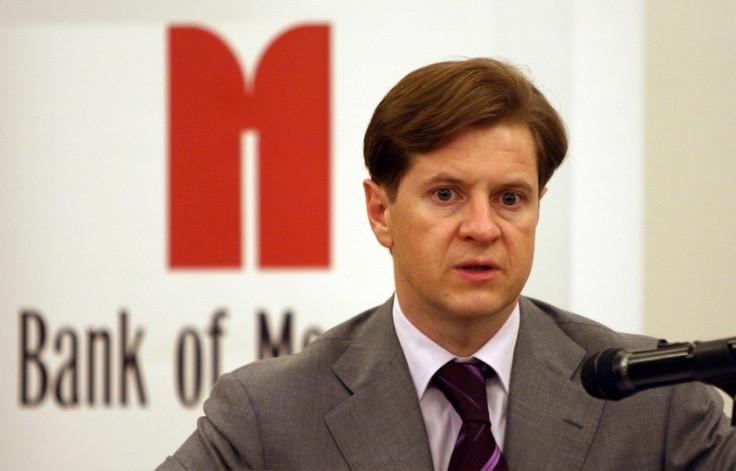Russia Denounces UK for Granting Political Asylum to Fugitive Banker Borodin

Britain's relations with Russia have sunk to a new low after the UK granted political asylum to a Russian banker accused of fraud by his own government.
Andrei Borodin, 45, said Britain had given him refuge after he presented evidence that embezzlement charges against him brought by prime minister and former president Dmitry Medvedev were politically motivated.
The Kremlin denounced the Home Office's decision, accusing Britain of interfering in an "ordinary criminal" matter and declaring Borodin's asylum claim a "simple ruse".
The former Bank of Moscow chief fled to London in 2011 and attracted attention after buying Britain's most expensive home, the £140 million Park Place Estate near Henley-on-Thames in Oxfordshire. The estate featured in the boarding school comedy St Trinian's.
Borodin was close to Yury Luzhkov, the former mayor of Moscow who was ousted three years ago, and his wife, the property magnate Yelena Baturina.
Last summer, Borodin became the subject of an Interpol "red notice" after he was accused of facilitating the loan of £270m from his bank - then partly controlled by the Moscow city government - to shell companies said to have paid an inflated price to buy land from Baturina.
Borodin alleges that the charges were fabricated after he resisted a state takeover of his bank. He accused "some people" of wanting to make "a nice profit" from the takeover.
"The president of Russia at the time, Dmitry Medvedev, was behind this," he said. "We revealed that we believe all the investigations conducted in Russia are politically motivated as a weapon of the Russian authorities to persecute me and my colleagues.
"The Russian authorities are pursuing an illegal and politically motivated witch-hunt against me. By giving me asylum, Britain has recognised that the Russian investigation against me is driven by politics.
"At first I thought this is official paranoia. Then I thought it was a way of stepping up the pressure on me. For fraud you get between eight and ten years in jail, but for trying to overthrow the state you get 20 years. They are trying to turn an alleged white-collar crime into terrorism."
Borodin claims he was forced to sell his stake in the bank, which was eventually taken over by the state. "I believe they were scared the Bank of Moscow might support former mayor Luzhkov, should he decide to go into Russian politics after his dismissal," Borodin said.
Asked whether he believed Russian president Vladimir Putin was involved, Borodin said: "Nothing important in Russia can be done without the knowledge of the number one in the country. Mr Putin built a system of autocracy, corruption and unprofessionalism in Russia and now he is a hostage to this system. And what happened to me is the result of the functioning of this system, whose father is Putin."
Russia requested Borodin's extradition from Britain last year. The decision to grant him asylum has infuriated the Kremlin.
Medvedev's spokesman Natalya Timakova said: "The practice of receiving political asylum, especially in England, has got to the point that it doesn't matter what the applicant did. What's important is to announce as loudly as possible that you are being politically persecuted and that will be a guarantee of receiving political asylum. We can only regret that this simple ruse worked again in the United Kingdom."
Russia's interior minstry said in a statement: "Russia's law enforcement agencies will keep pressing for the extradition of Andrei Borodin. He was accused of fraud in absentia and his name is on the international wanted list."
Former mayor Luzhkov told a Moscow radio station he was convinced of Borodin's innocence. "If Borodin was granted political asylum in England, then the English did that having enough basis to make such a decision," he said.
But Alexander Lebedev, the London-based billionaire and owner of the Evening Standard and Independent, condemned Britain's move, calling it "just not right".
"The Home Office needs to explain in some public forum why it considers a person who was never involved in politics is some kind of political dissident," said Lebedev. "We're talking about the boss of a huge bank where a vast sum of money went missing."
Lebedev, who lost the mayoral election to Luzhkov in 2003, added that "real dissidents" had "nothing to do with big money".
"The Kremlin has nothing to do with this," Lebedev added. "I don't believe that President Medvedev took away Borodin's business and persecuted him as some kind of politician, because he's not a politician."
Borodin declined to be drawn on Lebedev's comments. "I'm not really interested in the opinion of this gentleman," he said.
Borodin joins a succession of Russians wanted by Moscow but granted sanctuary in the UK. The Kremlin was incensed when Britain granted asylum to the former billionaire and oligarch Boris Berezovsky, and the Chechen rebel envoy Akhmed Zakayev.
Relations between Britain and Russia have been under serious strain since the death of Alexandr Litvinenko, the former KBG and FSB agent who defected to MI6. Litvinenko died after he was poisoned with the radioactive agent Polonium-210 at a London hotel.
Britain has demanded the extradition of Andrey Lugovoy to face prosecution in the UK for Litvinenko's death, but Russia has refused. Other Russian exiles have also been targeted, with security services suspecting Russia had a hand in the near-fatal shooting of businessman German Gorbuntsov.
Borodin alerted police after his car was chased at high speed on the M4 last year. "My concierge was pursued by a car with what turned out top be false number plates," he said.
"We are determined to fight all these charges, but from here, not from within Russia, with its political courts. We feel safer here."
© Copyright IBTimes 2024. All rights reserved.





